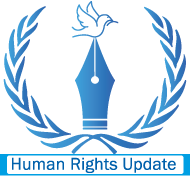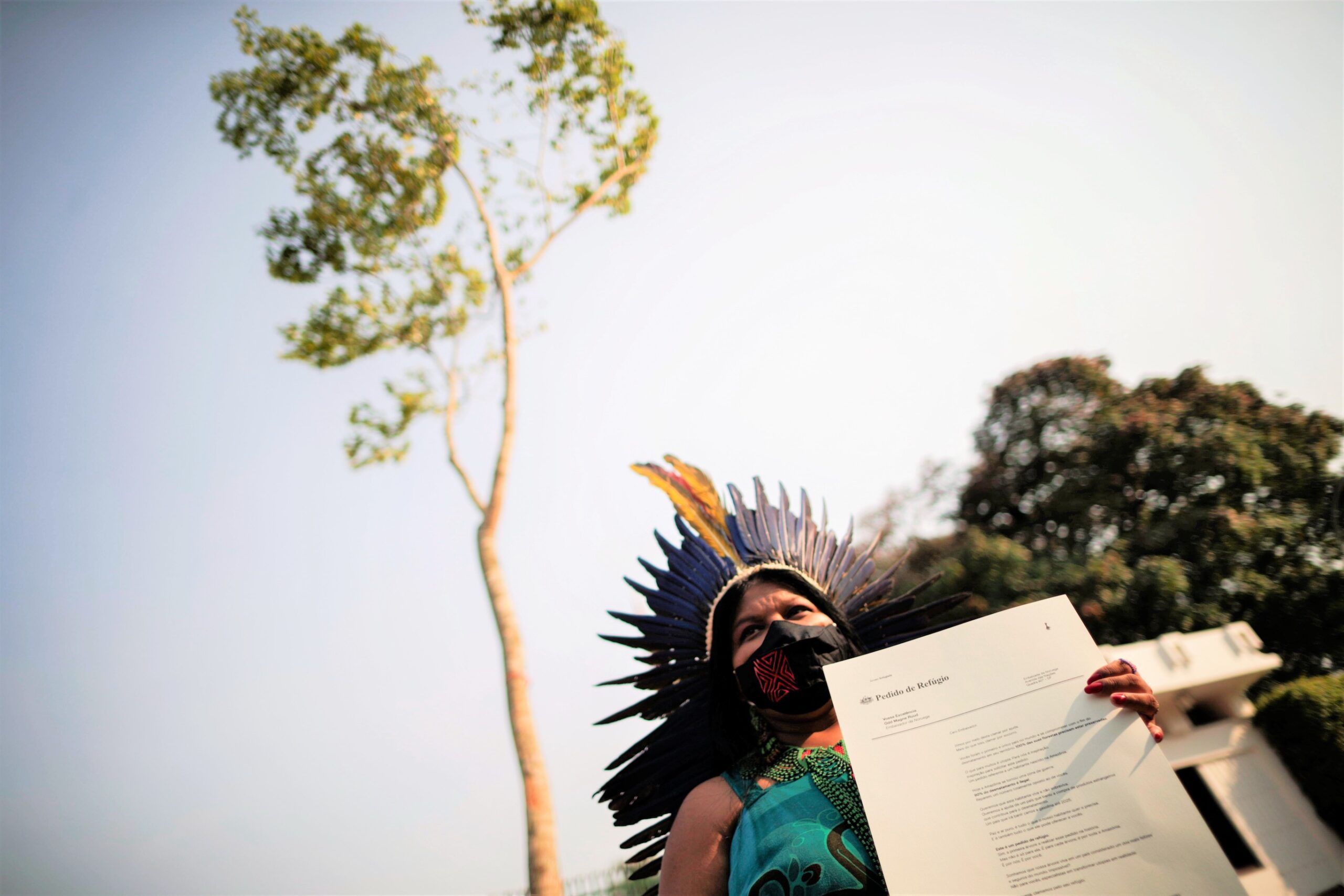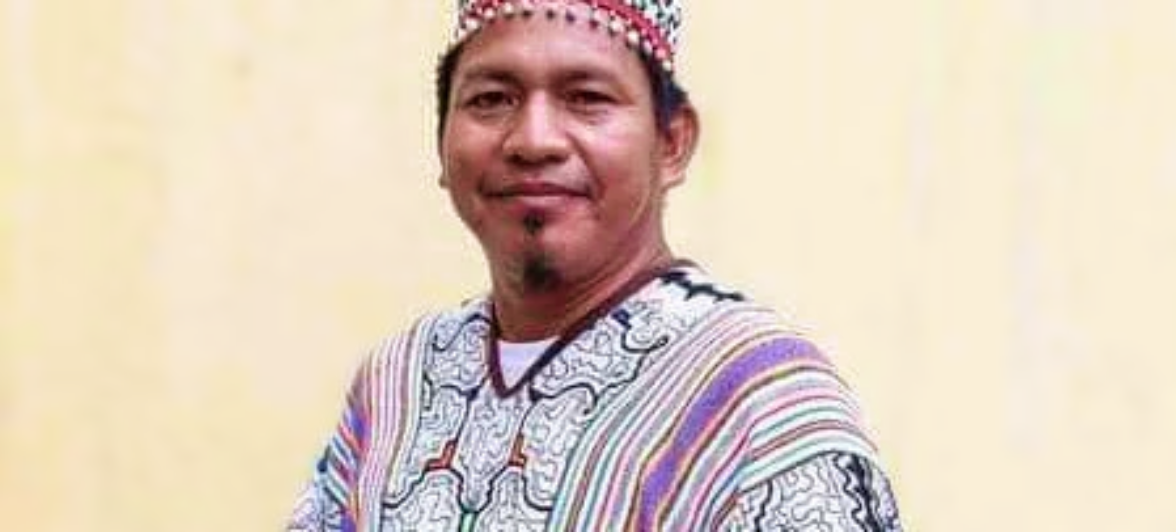Bangladesh’s prominent human rights organization, Odhikar, has long been at the forefront of advocating for human rights and justice within the country. Since its establishment in 1994, Odhikar has garnered international recognition for its tireless efforts to document human rights violations.
A significant part of Odhikar’s work has been its involvement in monitoring incidents along the Bangladesh-India border, particularly concerning the actions of the Border Security Force (BSF). While Odhikar’s meticulous reporting has shed light on the deaths of Bangladeshi citizens in BSF firings, recent events have raised concerns about the organization’s safety and independence.
In 2013, Odhikar’s Secretary General, Adilur Rahman Khan, and Director, ASM Nasir Uddin Elan, came under intense scrutiny from both the Bangladeshi and Indian governments. This scrutiny was directly related to Odhikar’s efforts to publish reports on border killings and enforced disappearance, a subject sensitive to both nations.
Odhikar gained international attention in mid-2013 when it reported on the deaths of activists from an Islamist organization at the hands of government law enforcement. The controversy began on May 5, when government security forces were mobilized at midnight to quell a rally organized by Hefazat E Islam in Dhaka. Hefazat E Islam claimed that a significant number of its members were injured, with some alleging that “two and a half to three thousand people died” during the operation at Shapla Chattar in Motijheel on May 7.
While the government refuted these claims, various witnesses confirmed that numerous people lost their lives during the operation. In response, Odhikar published a human rights report citing the deaths of several Hefazat E Islam Activist. However, this drew a strong reaction from the government, which demanded details of the deceased. Odhikar, in an effort to protect its sources, requested the formation of an independent inquiry commission to ensure the safety of the victims’ families. They pledged to provide the victim list to such a commission, but the government did not establish one.
The situation escalated further when, on August 10, 2013, Adilur Rahman Khan was arrested under the Information Technology Act. Subsequently, the police raided Odhikar’s office, seizing computers. Among the files discovered was a rough list of individuals potentially affected by extrajudicial deaths on May 5 and 6. This draft list was shared with the media as the one Odhikar had withheld. Then the police filed a case against Odhikar, alleging “distortion of information.”
Odhikar clarified that the final list they had used differed significantly from the draft seized by the police. Nevertheless, the government’s security forces accused them of manipulating the death toll. Odhikar maintained that their actions were in accordance with their documentation process.
Moreover, Odhikar had prepared a draft human rights report based on information from Hefazat E Islam and news reports. However, this led to fabricated charges against Adilur Rahman Khan and Nasir Uddin Elan, alleging wrongdoing in their pursuit of human rights.
A popular Bangladeshi newspaper, Prothom Alo, published a report on June 5, 2013, titled “Hefazat-e-Islam Bangladesh lists ‘killed and missing’ persons.,” which claimed that Hefazat E Islam had confirmed the deaths of 73 people in the May 5 midnight operation at Shapla square in Motijheel. Although Odhikar used this information, they were unfairly targeted for using Prothom Alo as a source.
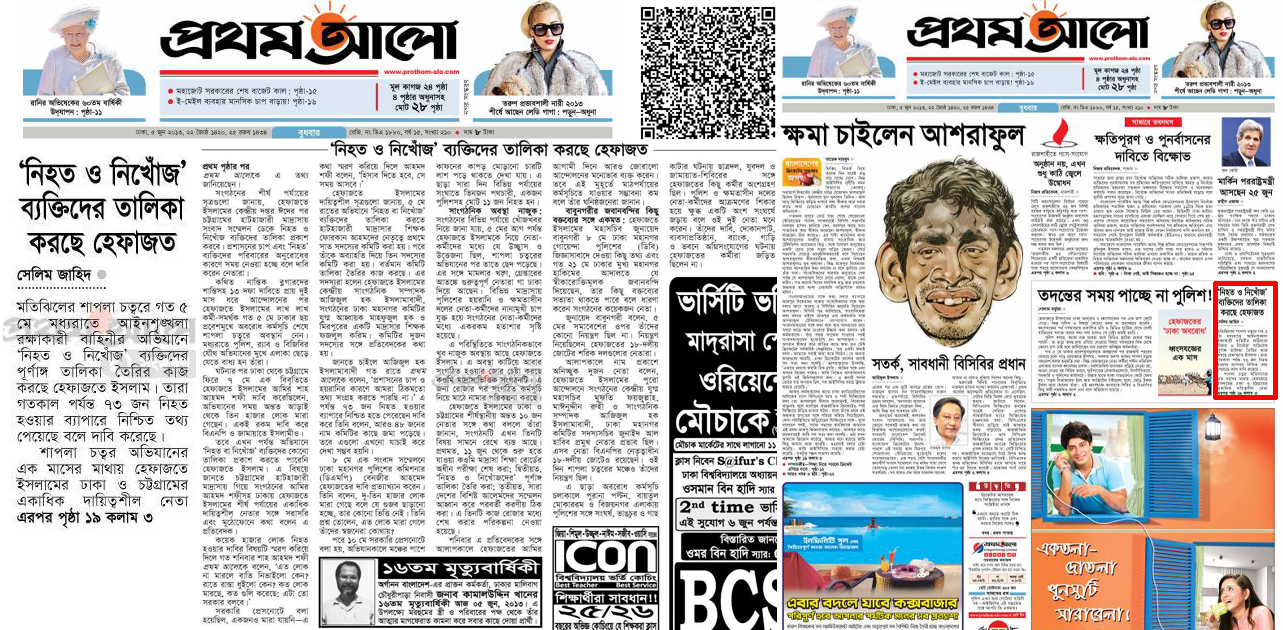
In a contrasting account, on November 8, 2013, the Awami League’s pro-government organization, Ekattorer Ghatak Dalal Nirmul Committee, asserted that 39 people were killed during the Hefazat-e-Islam rally. This claim was outlined in a white paper titled ‘400 Days of Radical Sectarian Terrorism by Hefazat-Jamaat,’ prepared by The Ekattorer Ghatak Dalal Nirmul Committee of 1971. The Ekattorer Ghatak Dalal Nirmul Committee of 1971 also claimed in their white paper that on August 6, 2013, they received a five-page list from Hefazat via email. Hefazat-e-Islam provided the names of 79 “martyrs” in that list.
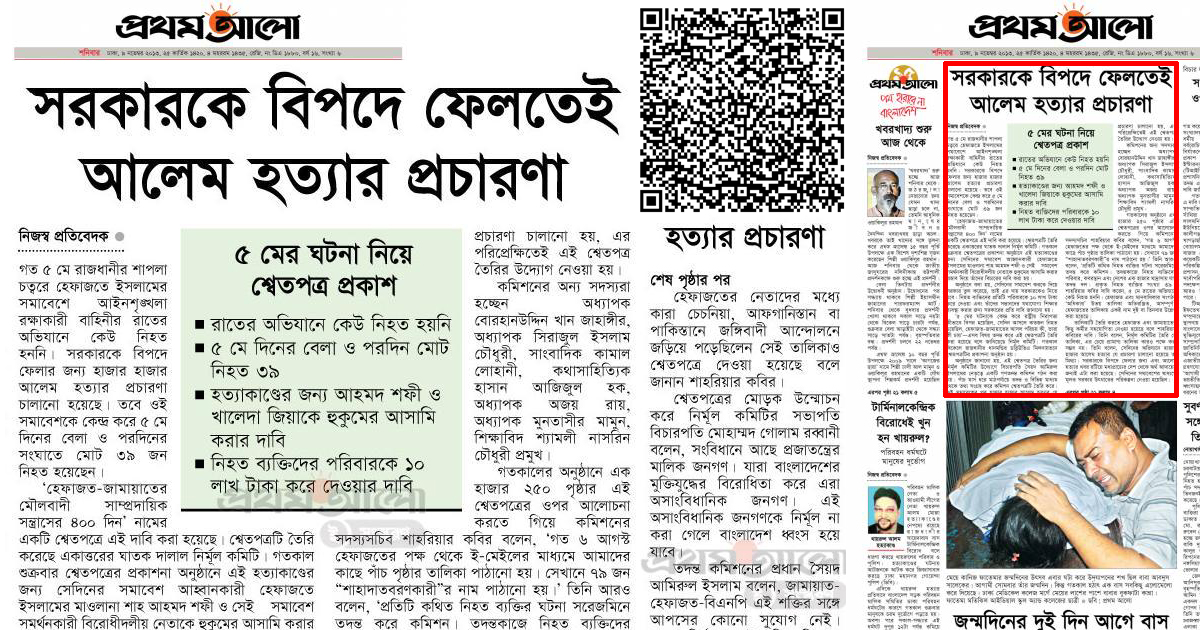
Throughout these events, Odhikar collected data from various sources, including collaboration with Hefazat E Islam, to create a comprehensive report on human rights violations. However, despite Odhikar’s collaborative and fact-based approach, their actions have been met with legal challenges and accusations of fabrication.
Notably, despite these allegations and attempts to criminalize Odhikar, no legal actions were taken against those source that published similar information. This raised questions about the government’s selective targeting of Odhikar.
In a separate development, Odhikar’s registration renewal was blocked in 2014, eventually leading to its cancellation on June 5, 2022, by government order. This decision was met with criticism from United Nations experts, who viewed it as a violation of the ‘Freedom of Association Odhikar’ under Article 22 of the ICCPR.
Odhikar’s work and data on extrajudicial killings and enforced disappearances in Bangladesh have been recognized globally, with their statistics being used by various human rights organizations and UN agencies. Despite this, they have faced increasing government resistance and accusations of being against the state.
On February 14, 2021, the Appellate Division of the Supreme Court of Bangladesh rejected Odhikar’s appeal to quash a cybercrime case. Subsequently, the Cyber Tribunal of Dhaka began the trial against Adilur Rahman Khan and Nasiruddin Elan. The court concluded the examination of witnesses on April 5, 2023, but the judge allowed further investigation without specifying its scope. Odhikar’s defenders have faced defamation in the media, both at the organizational and individual levels.
The ongoing legal harassment of Odhikar’s leaders and the organization itself has drawn international attention and condemnation. The arguments in the case against Adilur Rahman Khan and Nasiruddin Elan concluded on August 24, 2023. The verdict, initially scheduled for September 7, has been postponed to September 14.
The recent legal proceedings against Adilur Rahman Khan and Nasiruddin Elan, in which the verdicts were initially expected on September 7, have prompted concerns about the independence of the judiciary in Bangladesh. Many believe that this verdict may significantly impact the future of human rights activism in Bangladesh.
The international human rights community is closely monitoring the upcoming verdict on September 14, hoping that the Cyber Tribunal Court will acquit Odhikar Secretary General Adilur Rahman Khan and Director Nasir Uddin Elan. This case represents a landmark moment in Bangladesh’s history, as it marks the first time the restrictive Information Technology law has been used against human rights defenders. The outcome will have global significance, as it will demonstrate whether the Bangladesh government can uphold justice and protect human rights activists amid allegations of interference in the judiciary. The global human rights community is awaiting the verdict on September 14 with bated breath, recognizing that it will set a precedent for the protection of human rights activists in Bangladesh and beyond. However, there are growing concerns about the government’s influence over the judiciary in Bangladesh.
United Nations experts have raised alarms over the defamation of Bangladesh-based human rights organizations by high-profile public figures. This concerted effort aims to undermine these organizations’ credibility, reputation, and human rights work in the country. These experts have called on the Bangladesh government to cease retaliation, judicial harassment, and propaganda against human rights defenders. They highlight the intimidation and harassment faced by Adilur Rahman Khan and ASM Nasiruddin Elan and emphasize the need for a safe and supportive environment for human rights defenders and civil society representatives to carry out their essential work. These cases represent a significant test for the country’s commitment to upholding human rights and the independence of its judiciary.
As the world watches, the impending verdict on September 14 holds profound significance. It will not only determine the fate of Odhikar’s leaders but also serve as a litmus test for the protection of human rights activists in Bangladesh. The international community remains hopeful that justice will prevail, preserving the critical role of human rights defenders in advocating for the welfare and protection of all people in Bangladesh. However, the ongoing concerns about the independence of the judiciary and the influence of the government in legal proceedings underscore the challenges faced by human rights defenders in their tireless pursuit of justice and human rights in Bangladesh.
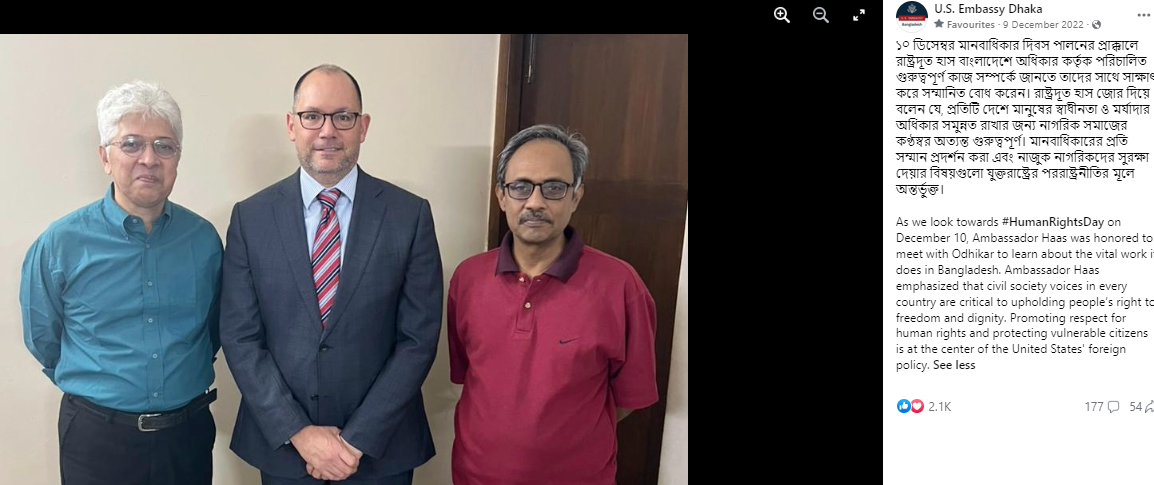
The global community has honored Adilur Rahman Khan for his unwavering commitment to human rights. Adilur Rahman Khan’s long-standing dedication to human rights and his contributions have been recognized through numerous awards, including the Robert F. Kennedy Human Rights Award, the IBA Human Rights Award, the Franco-German Human Rights Prize, the Gwangju Prize for Human Rights, and more. Despite the challenges and harassment, Adilur Rahman Khan and Odhikar remain steadfast in their commitment to human rights in Bangladesh.
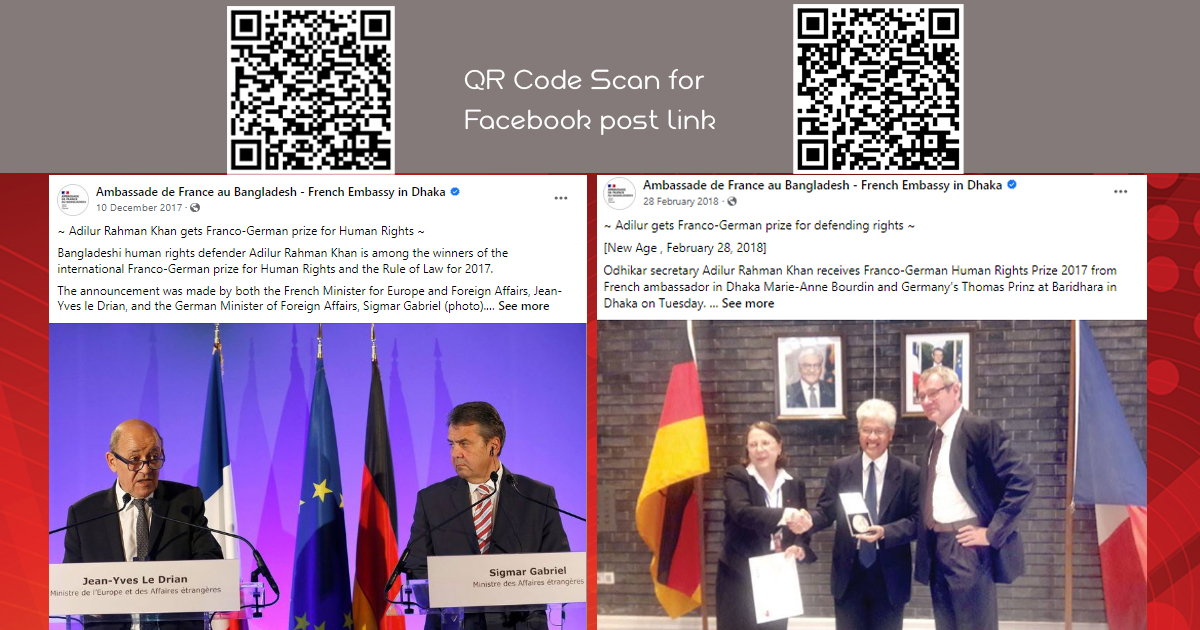
Adilur Rahman Khan, a distinguished Advocate of the Supreme Court of Bangladesh, has a storied history of championing human rights and justice. His activism dates back to his days as a law student at Dhaka University, where he played a pivotal role in the movement to establish democracy during the military rule of Lieutenant General Hossain Mohammad Ershad, who declared martial law in 1982.
Adilur’s dedication to the cause continued as he embarked on his legal career. He became a prominent figure in cases concerning “Freedom of Speech,” defending journalists who faced charges or detention as a means to silence them. He fearlessly confronted authorities, including former President Ershad, and secured convictions of police officers found guilty of torture and causing death in custody.
In his decades of activism, Adilur Rahman Khan has tirelessly defended political detainees, trade union activists, and the families of victims of enforced disappearances and extrajudicial killings. He has built a nationwide network of rights defenders and leads Odhikar, Bangladesh’s foremost human rights organization.
Furthermore, Adilur Rahman Khan is a member of the General Assembly of the World Organization against Torture (OMCT) and serves as the Secretary-General of the International Federation for Human Rights (FIDH).
In a significant acknowledgment of his efforts, French President Emmanuel Macron praised Adilur Rahman Khan for his relentless struggle against torture, extrajudicial killings, and human rights violations committed by Bangladesh’s security forces. This recognition came during a ceremony marking the centenary of the International Federation for Human Rights (FIDH).
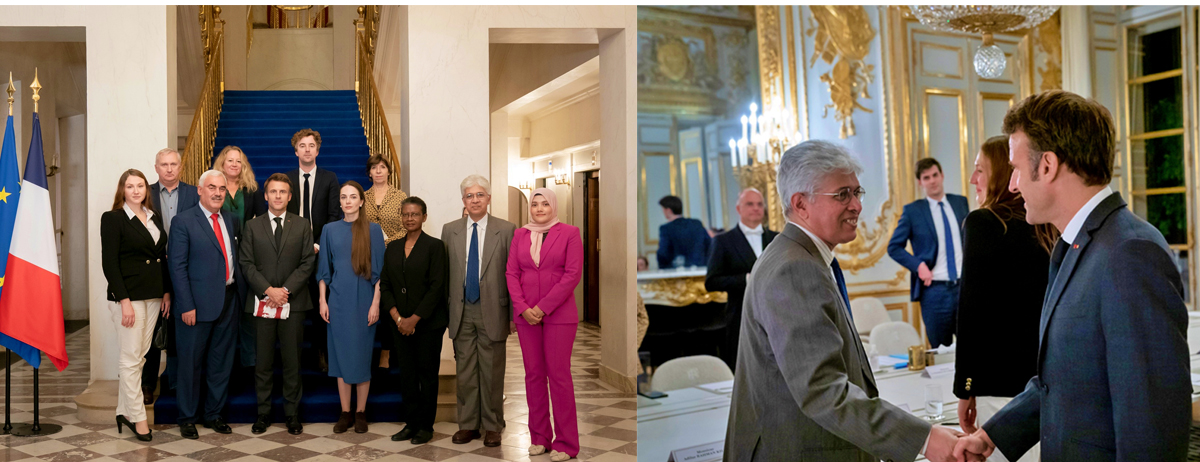
Despite facing adversity and defamation, Adilur Rahman Khan and Odhikar remain resolute in their mission to advance human rights in Bangladesh and beyond.
At this time, The international human rights community anxiously awaits the outcome, hopeful that justice will prevail and that human rights defenders like Adilur Rahman Khan, ASM Nasir Uddin Elan can continue their vital work without fear of reprisals. The case against Odhikar and its leaders underscores the challenges faced by human rights advocates in their relentless pursuit of justice and human rights protection in Bangladesh. The eyes of the world remain fixed on this critical juncture in the ongoing struggle for human rights and justice.
